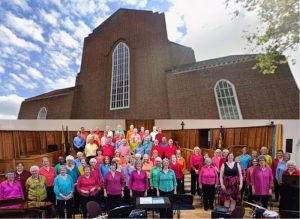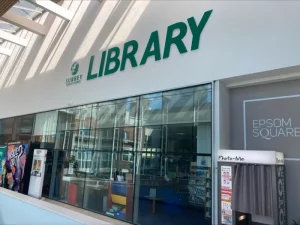Saturday 14th June. In a town better known for its racecourse than rock and roll, Epsom discovered a new spirit last weekend with the first-ever Epsom Square Music Festival – an ambitious, joyful celebration of grassroots talent and community spirit.
“We just wanted to get more music into Epsom,” said Toy, the festival’s organiser, speaking from Metropolis (formerly Epsom Social) which served as the hub of the day-long event. “As a new venue, it felt right to do something for the community.”
The result was ambitious by any measure: three outdoor stages and over 100 performers across 39 acts, playing everything from acoustic soul to funk and rock. The diversity wasn’t only musical, either. “We had performers as young as four, maybe younger,” Toy said, “and then, of course, we had the proper grown-ups too.” The result was a line-up that reflected the whole community, mirroring Epsom in all its lively charm.
The festival came together in just six weeks, a feat made possible by local support and backing from sponsors such as Epsom Picturehouse, Go Epsom, Epsom & Ewell Families, and music retailers Guitar Guitar and Realistic Music Academy, both of which sponsored their own stages. “We’re so lucky in this town,” said Toy. “There are so many individuals who are brilliant at what they do that, if you decide to throw together a music festival in six weeks – it’s entirely doable,” she laughed. “Though next time, I’d like a bit more lead time.”
Toy, who also runs the Realistic Music Academy, knows the town’s creative undercurrent better than most. Attracting performers was “actually really easy”, she said, as she “just put out a post, and suddenly we had 38 acts signed up… the interest is absolutely there.”
The crowds clearly agreed. Nearly 500 free tickets were ‘sold’ in advance, but many more drifted into the square over the weekend, drawn by the buzz of the music and conversation.
On stage, highlights came thick and fast from a variety of performers, but it was local newcomers Vault, a four-piece with an average age of just 14, who perhaps best captured the festival’s mission. “This is the only way for us to get out there,” they said. “There should be more venues – other than Metropolis, there’s not many places for us to play.”
Toy, who also runs Realistic Music Academy, agrees. “There’s definitely a need for more places to play music in Epsom,” she said. “I’d love to do this again next year. I just want more of it – more stages, more performers, more everything.”
But beyond the lively crowds and standout performances, the weekend carried a deeper message: local music matters, community matters – and when Epsom comes together, it’s capable of creating something genuinely special. A triumph of town spirit – and, with any luck, the start of something much bigger.
For those who love jazz Epsom’s own Epsom Jazz Club stages monthly live jazz nights with quality national and international artists at the Epsom centrally located Comrades Club in The Parade Epsom. The next jazz evening at 7.30pm is Thursday 26th June featuring Atlanticus. See www.epsomjazzclub.com for details.
Donovan Livesey
Photo is of the band “Vault”.











